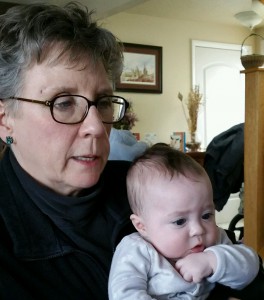As I sit with my five-month old grandson, I often wonder what the day-to-day world would be like if our society slid into some type of dystopian existence in which we lost our collective voices, a.k.a. our national and state agencies, for the arts and humanities….
What if new car designers were nonexistent?
What if T-shirts bore no logos to claim sports loyalties?
What if no music played over earbuds?
What if everyone wore the same clothes because there were no designers envisioning and creating something different?
What if we had no theaters, Netflix or television because no movies were produced?
What if no one photographed and recorded our natural world?
What if there were no saddlemakers, no potters making mugs, no one making stained glass windows for places of worship?
What if writers, whether J.K. Rowling or Russell Rowland, had never felt the urge to tell a tale?
The current proposals to eliminate or cut funding for arts and humanities, whether rumor or fact, federal or state, sounds the alarm for me. The arts and humanities help us to shape a kinder, more sustainable vision for our tomorrows, and because of that, they deserve our support.
In the omnipresent immediacy of the uproar of daily national events since January, it can become increasingly difficult to prioritize battles. Moreover, when federal and state lawmakers embark on the sausage making of casting about for ways to save or spend, it can become far too easy to raid “a few million here, a few million there” to patch together funding for some bigger, shinier idea.
Such a raid can kill or maim the programs of already under-supported arts and cultural institutions like the National Endowment for the Arts (NEA), the National Endowment for the Humanities (NEH), and state organizations like the Montana Arts Council, and Humanities Montana. In addition to sending a message of what we value, the ripples impact us daily.
Arts and cultural organizations across our nation encourage and nurture the richness of our collective creativity and our creative health. Given that, what if we knew how much it costs each of us per year to invest in these organizations?
Each American invests about $.46 a year to fund the NEA and about another $.46 a year to fund the NEH. From 2014-2016, Montanans received the benefits through MAC of a total of $2.3 million and through Humanities Montana and museums of more than $2.1 million. What Montanans pay additionally for MAC and donate to Humanities Montana is less than what a pack of gum costs now.
What if we recognized and built on our return on our investment? Both the arts and humanities provide what economist Mark Anielski identifies as “Genuine Wealth,” which includes far more than GDP (Gross Domestic Product):
• Human wealth comes from us – our knowledge, skills, health and attitude. The arts and humanities teach us how to live. They develop innovative thinking and problem-solving skills, exactly what 97% of U.S. employers have identified as an essential job skill.
• Social wealth includes our relationships and networks. Research shows that residents of communities that encourage the arts and humanities are happier and, over time, develop healthier economies.
• Natural wealth comes from our air, land, and water. For example, the art form of photographing Montana’s natural wealth has built appreciation for our state, while drawing 12 million non-resident visitors in 2014. Those people spent $3.5 billion here, supporting over 38,000 jobs.
• Manufactured wealth is everything that we create and make – infrastructure, buildings and all products. Just one part of the creative sector, films, books, and television, account for $1.63 trillion of national GDP.
• Financial wealth is what we earn, owe, and save. In 2012, arts and cultural goods added more than $698 billion to the U.S. economy. For example, roughly one in sixty Montanans are working artists, Montana’s Artrepreneur Program© alone has empowered over 400 Montana artists to learn locally how to build and grow sustainable businesses in art.
Our miniscule investments in the NEA, NEH, and our state organizations provide a collective voice for us.
They help us see the past more clearly to learn its lessons.
Our investments in them help us to build fuller lives in a present enriched by all our assets.
Those investments send a message to the future of who we are and what we value. When asked to cut funding for the arts in Britain during WWII, Winston Churchill was reported to respond, “Then, what are we fighting for?”


